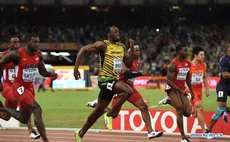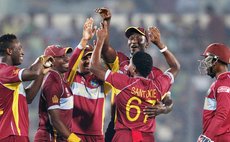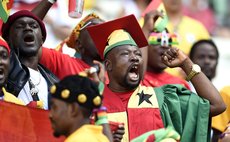Model Approach to Performance for West Indies
In the wake of the decision by the ICC to entrust the administration of international cricket to the Big Three-England, Australia and India, it is of great interest to see how the current three-match series between South Africa and Australia will play out, particularly as South Africa-excluded from the controlling triumvirate-are present holders of the No. 1 ranking in Test cricket and would be eager to restrain the Aussies who have created a strong resurgence by beating England humiliatingly 5-nil only a couple of weeks ago. The exclusion of South Africa within the major sphere of decision making has to be an outrageous anomaly explainable only in money making terms. Biggest revenues accruing from gates and attendant television receipts lie with England, Australia and India, with the last named country favoured by lopsided spectator attendances.
There was an element of nervousness impelled by off-field circumstances. South Africa won the toss and strangely did not decide to bat in the opening test at Centurion Park. This proved critical. After the early break through which saw Australia on 98 for four, their fortunes were restored by Shaun Marsh whose 148 justified the selectors' decision to recall him to replace Shane Watson who was injured in warm-up proceedings. Equally significant, too, was Steve Smith's 100 in the 5th wicket partnership with Marsh realizing 233 runs. Try as the South African bowling machine may, they failed to restrain the Aussies from posting an encouraging first innings of 397 in 122 overs.
Round one then went resoundingly to Australia and Michael Clarke and his men proved how tenacious they can be when once getting their teeth into a game. Another thing, it proves difficult to resist perhaps the fastest bowler in world cricket-Mitchell Johnson. He continued where he left off against England and was awesomely devastating with seven for 68, making short work of the South African captain Graeme Smith, McLaren and A.B. De Villiers in the top order. Only De Villiers with 91 looked capable and unafraid of Johnson's torrid pace, late swing and hostility. He was the sole shining star amid the ruins of 206 all out and justified claim laid on him as the best batsman playing the game at present.
Australia proceeded to disallow any way back for their opponents, and opener David Warner smashed his way to 115 to enable declaration on 290 for four wickets and offer the daunting target of 482. The conclusion was a foregone one. South Africa bundled out for 200 in 60 overs, leaving Mitchell Johnson to beat his chest with five for 59 and a match haul of 12 for 127 and the automatic Man of the Match accolade.
Australia had wreaked havoc, dominating the match as much by their batsmen attacking the South African bowlers as by the quelling effect of Johnson's thunderbolts. The winning margin was 281-executed in less than a full four days and with thunderous authority. The series standing is at 1-nil to Australia.
Five days later on 20th February, a moment of truth faced South Africa, and their manner of coming to grips with this should be instructive to a hopeful side like West Indies. At Port Elizabeth they appreciated the enormity of the task, batted first and accumulated 423 in 151 overs.
The South African batting hierarchy appreciated the dire need to subdue Johnson at all costs, not to attack him unduly but to tame him by applying a smothering layer of defense to blunt his cutting edge. Result was Dean Elgar 83, Du Plessis 55, Duminy 123 and De Villiers 116 had defused Johnson rather admirably even though off spinner Nathan Lyon filled the breach with five for 130. It was quite a tactical victory.
In its wake Australia was hammered into submission: 246 all out, with Warner 70, Smith 49 not effective enough against the pace of Morne Morkel 3 for 6, Vernon Phillander 3 for 68.
Leading by 177, the Springboks amassed 270 for 5 before declaring on the strength of Hashim Amla's 127 not out. The target offered Australia was 448 and achieving this would be a formidable world record.
A defiant opening partnership of 126 by left handers Warner, 66 (from 73 balls) and Christ Rogers whose 107 helped to hold up South Africa's winning effort, all came to no avail as 10 wickets collapsed for 90 runs. Dale Steyn underlined his rating as the most consistently effective pace bowler with 5 for 59 to add to his other 4-wicket haul of the first Test.
It is a matter of the 3-match series standing level at 1-all-and, above all, South Africa taking the match in four days, establishing a psychological equality of coming on par with their major adversaries, and all to play for in the upcoming third Test decider.
What can West Indies learn from this? They should at least digest fully that Test cricket is serious business. That if you do not have the fire power to bowl out your opponents twice, you should bat resolutely for the best you can get out of the match-at least an honourable draw. But the batting must be predicated on a highly valued resolve to elevate the performance standard. South African displayed the true mettle of world champions, and theirs is an approach and outlook for everyone else to follow. Test cricket should always be very serious business-all the time. Incidentally, we recall the magnificent effort of Nicolas Pooran for West Indies in the quarter final of the Under 19 World Cup in Dubai against Australia. He scored 143 in a losing battle, but he showed much of the grit and determination so often lacking in the West Indies senior side. All concerned should take note.




